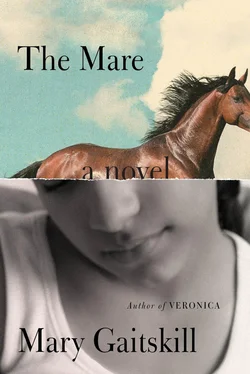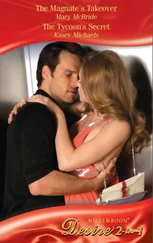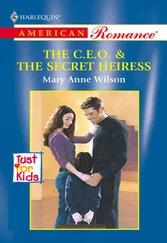“That’s why,” said Paul. “I think that’s why. He took advantage of the fence.”
If I could see it happening between him and Redhead, probably everybody saw it. Maybe that’s why those women didn’t respect Ginger. The ones that talked to us first.
Girls came out in flowered blouses and cowboy hats, on horses with huge muscles. I saw that one of them was Beth. I remembered how when I first saw her, I thought she had a chin like a pit bull’s — her chin had basically taken over, and on her horse she was like the biggest bitch in the world. Woman-music came on and she paraded in a circle with the others while Ass-Voice said how pretty they were. That body awareness translates into every aspect—
And Ginger had to know — she had to — but instead of being mad at Paul, she was mad at the women that talked to us, the nice ones. On the way home from the party, she was telling Paul what a bitch the dancer lady was, and then he was annoyed at her.
Beth and her horse ran around barrels nearly sideways and sprayed dirt, the horse’s eyes cold-hard and its legs crazy, and I was glad when her leg flew out and smacked the barrel and then her hat fell off.
Ginger said, “Do you think you’d like to do that?” I said, “No,” and she said, “Why not?” I said, “I just don’t.” And then I said, “Remember that lady that said I could come to the other barn? Could I do that?”
Ginger didn’t answer, but Paul did. He said, “I think that’s a good idea. It would be interesting to see what another barn is like.”
I looked at Ginger to see if she heard that like I did — but then everybody went “Wahhhh!” and I saw this bull was going to kill a boy for real. He was running for his life while his goofy music played Bored! Born! Bored! and he barely got over the fence— Born to be alive! — before the bull slammed its horns into the wall just under the boy’s butt, then went after the clowns. I said, “Damn!” and Ginger and Paul both smiled at me. The bull got tired and decided to go back into the pit.
Then out of nowhere, I heard Shawn’s voice, like really heard it, like in my ear, saying, Lil’ Orphan Annie. Which did make some sense because I felt alone.
She didn’t call me when she got home that night and when I called her she didn’t really want to talk. She sounded happy to hear from me, but she was quiet. She didn’t respond when I mentioned coming to ride on the weekend.
When I called her the following week, her mother talked harshly at me and then handed the phone to her brother. He said, “She’s asleep”; he said it the same way Velvet said “Ahh dunno” at the faculty party. There was cartoon noise in the background; I pictured him in the dark with a flashing television. “Can you ask her to call me when she wakes up?” “Sure,” he said. Then he put the phone down. He didn’t hang up, he just put it down. I thought maybe he was going to wake her right then so I stayed on the line. Cartoons talked, commercials flashed in the gaps, there was running water and Mrs. Vargas talking to someone somewhere in the jumbled distance. I thought it must be Velvet until I heard the boy answer. Still, I waited several minutes before hanging up.
The night I came home I asked my mother why I never heard from my father. Why he sent money and birthday cards, but only sometimes, and only to Dante, not me. Even though people say mothers love their sons more, but fathers love their daughters more. At least that’s what Mrs. Vasquez from our old building said when I told her my mom liked Dante better than me. I didn’t get into that with my mom, though. I just asked why I didn’t hear from him. She said, “Sit down. I’m going to tell you something.” I sat down. She said, “The man you call your father isn’t your father. He’s Dante’s father, but not yours.” I said, “But I called him Papi and he answered.” She said, “I asked him to do that.”
I said, “But he gave me the shells.”
“No he didn’t. I did. I found them on the beach at Providence while I was pregnant with you. I kept it for you.”
I couldn’t talk anymore. She came to me and put her arms around me. My head went against her; she smelled to me like she used to, like safety. My body trembled, but I didn’t cry. It felt too bad for that. She said, “I’m sorry. But you are old enough to know the truth. I haven’t seen your father since I left DR. He said he would come for me, but he didn’t. Now you know what I mean when I say ‘bad blood.’ ”
I moved away from her and her arms came off me. I stood up. “Just because he didn’t come for you doesn’t mean I’m bad.”
She looked like she was going to slap me, but she didn’t. She looked like I slapped her; she even put her hand to her face. I was going to say I was sorry, but then she said, “Something else you need to know. I lost my job and I need to rent your room out. When I do, you’ll have to sleep on the couch.”
I called again the first week of school and nobody answered the phone. But the next day a teacher from Velvet’s school called me. She wanted me to know that Velvet had turned in a beautiful paper about a horse; she said it was probably the most beautiful paper she’d ever seen from a student. Technically, she wasn’t supposed to call me, but she knew it would really matter to me, and she wanted to tell me. I said, “How did Velvet react when you told her?” “I haven’t yet,” said the woman. “Velvet hasn’t been in school all week and I can’t get her mother on the phone. Do you know what’s going on?”
My first week at school they beat a old man and made him crawl on glass. If I said that to Ginger she would say, “ ‘They’? Who is ‘they’? Be specific.” And I would be thinking, What difference does it make? They beat a old man. Anyway, I didn’t know who they were; they were kids in my school a few grades above me.
But I saw them doing it. It was the morning before the school opened. Most kids stand by the door waiting to go in, but I walked away from them that day because I was missing my horse and also thinking about what my mom told me, and how she looked at me when I said I wasn’t bad just because my father didn’t want her. Or me. I walked to the side of the school and I saw these older kids in the back, way at the end of the basketball court, crowding around. Even from far away it looked like something bad. But I mind my own business, and anyway the doors were open and my homeroom teacher, Mr. Stamford, was yelling at me.
They next day the homeroom teachers yelled at all of us. They used words like vicious and decency. They said the old man was small and crazy and the boys said they would burn him and made him crawl on the glass while they kicked him; Mr. Stamford yelled about jail. Teachers have been yelling at us about jail since first grade, so somebody just said something funny in the back and people laughed. “That could’ve been your father or your grandfather!” yelled Mr. Stamford. But it couldn’t. Not mine. I didn’t have a father or grandfather anymore.
I finally got her on the phone. I told her how proud I was that she turned in her essay. I asked her what the teacher said to her about it. She said, “Nothin’.” I said, “What do you mean? How could she tell me it was great and tell you nothing?” She said, “Ahh dunno” and then, abruptly, asked me if I could get her into a better school. How could I do that? I asked. What kind of school? She said, This girl Marisol is going to Catholic school next year. “What kind of grades does Marisol get?” I asked, and she snapped at me. “If you can get your grades up, I’ll talk to Paul about it,” I said without hope. “And then we can talk to your mother.”
Читать дальше












